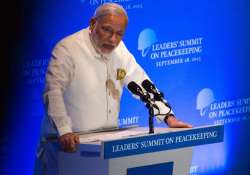India announces more troops for UN peacekeeping, pushes for UNSC reform
New York: India on Monday announced plans to contribute an additional 850 troops to the UN Peacekeeping Missions around the world and also pushed for reform of the UN Security Council.Prime Minister Narendra Modi, in

New York: India on Monday announced plans to contribute an additional 850 troops to the UN Peacekeeping Missions around the world and also pushed for reform of the UN Security Council.
Prime Minister Narendra Modi, in his address at the Leaders' Summit on UN Peacekeeping here, also said India is ready to contribute monetarily to a memorial for slain UN Peacekeepers.
Modi said India's commitment to UN Peacekeeping remains strong and will grow.
"We have announced new intended contributions to the UN Peacekeeping operations.
"These include additional battalion of up to 850 troops in existing or new operations; additional three police units with higher representation of female peacekeepers; commitment to provide critical enablers; deployment of technical personnel in UN missions; and, additional training for peacekeepers at our facilities in India and in the field," Modi said.
Also Read: G4 countries make strong pitch for change in UNSC
Pushing for long-awaited reforms of the UN Security Council, Modi stressed that the success of UN peacekeeping "ultimately depends not on the weapons that the soldiers carry, but on the moral force that decisions of the UN Security Council command".
"We must complete the long-pending task of reforms within a fixed time frame of the UN Security Council to preserve the relevance and effectiveness of the UN," he said.
Elaborating on the Indian contribution to the UN Peacekeeping operations, he said that 180,000 Indian troops have participated in UN peacekeeping missions - more than from any other country.
"India has participated in 48 of the 69 UN peacekeeping missions so far. 161 Indian peacekeepers have made the supreme sacrifice while serving in UN missions," he said.
Pointing out to challenges that peacekeepers face, he said the soldiers are called upon not only to maintain peace and security, but also address a range of complex challenges.
"Mandates are ambitious; but, resources are often inadequate. Mandates sometimes make peacekeepers party to conflicts, putting at risk their lives and success of their missions," he said.
"The problems arise to a large extent because Troop Contributing Countries do not have a role in the decision-making process. They do not have adequate representation in senior management and as Force Commanders," he said, raising the demand of troop contributing countries for greater say in the UN Peacekeeping mandate.
"Peacekeeping missions should be deployed prudently, with full recognition of their limitations and in support of political solutions," Modi said.
He said India is pleased that the High-level Independent Panel on Peace Operations has recognized these issues. "We thank UN secretary general for his prompt report on the Panel's recommendations. We look forward to their early consideration," Modi said.
Earlier, in the speech Modi said India has been providing training to peacekeeping officers from a large number of countries. "Till date, we have trained nearly 800 officers from 82 countries."
He also thanked US President Barack Obama for hosting the Summit on Peacekeeping, terming it timely because it is the 70th anniversary of the UN and also "because the security environment is changing, the demands on peacekeeping are growing and the resources are harder to find".
In the beginning of the speech, he said: "The foundations of the United Nations were laid by the brave soldiers on the battlefields of Second World War. By 1945, they included 2.5 million men of the Indian Army, the largest volunteer force in history. More than 24000 lost their lives and nearly half of that went missing."
"The legacy of that sacrifice is shared by three countries present here. They remain today among the largest contributors to the United Nations Peacekeeping Operations," he added.